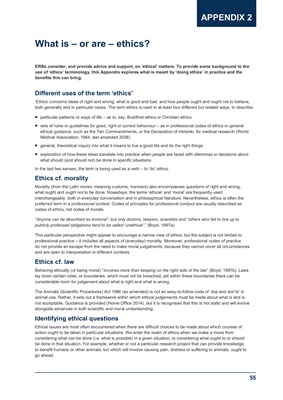
55
Different uses of the term "ethics"
"Ethics" concerns ideas of right and wrong, what is good and bad, and how people ought and ought not to behave,
both generally and in particular cases. The term ethics is used in at least four different but related ways, to describe:
particular patterns or ways of life - as in, say, Buddhist ethics or Christian ethics
sets of rules or guidelines for good, right or correct behaviour - as in professional codes of ethics or general
ethical guidance, such as the Ten Commandments, or the Declaration of Helsinki, for medical research (World
Medical Association, 1964, last amended 2008)
general, theoretical inquiry into what it means to live a good life and do the right things
exploration of how these ideas translate into practice when people are faced with dilemmas or decisions about
what should (and should not) be done in specific situations.
In the last two senses, the term is being used as a verb - to "do" ethics.
Ethics cf. morality
Morality (from the Latin mores, meaning customs, manners) also encompasses questions of right and wrong,
what ought and ought not to be done. Nowadays, the terms "ethical" and "moral" are frequently used
interchangeably, both in everyday conversation and in philosophical literature. Nevertheless, ethics is often the
preferred term in a professional context. Codes of principles for professional conduct are usually described as
codes of ethics, not codes of morals:
"Anyone can be described as immoral", but only doctors, lawyers, scientists and "others who fail to live up to
publicly professed obligations tend to be called "unethical"." (Boyd, 1997a)
This particular perspective might appear to encourage a narrow view of ethics, but the subject is not limited to
professional practice - it includes all aspects of (everyday) morality. Moreover, professional codes of practice
do not provide an escape from the need to make moral judgements, because they cannot cover all circumstances
and are open to interpretation in different contexts.
Ethics cf. law
Behaving ethically (or being moral) "involves more than keeping on the right side of the law" (Boyd, 1997b). Laws
lay down certain rules, or boundaries, which must not be breached; yet within these boundaries there can be
considerable room for judgement about what is right and what is wrong.
The Animals (Scientific Procedures) Act 1986 (as amended) is not an easy-to-follow code of "dos and don"ts" in
animal use. Rather, it sets out a framework within which ethical judgements must be made about what is and is
not acceptable. Guidance is provided (Home Office 2014), but it is recognised that this is not static and will evolve
alongside advances in both scientific and moral understanding.
Identifying ethical questions
Ethical issues are most often encountered when there are difficult choices to be made about which courses of
action ought to be taken in particular situations. We enter the realm of ethics when we make a move from
considering what can be done (i.e. what is possible) in a given situation, to considering what ought to or should
be done in that situation. For example, whether or not a particular research project that can provide knowledge
to benefit humans or other animals, but which will involve causing pain, distress or suffering to animals, ought to
go ahead.
APPENDIX 2
What is - or are - ethics?
ERBs consider, and provide advice and support, on "ethical" matters. To provide some background to the
use of "ethics" terminology, this Appendix explores what is meant by "doing ethics" in practice and the
benefits this can bring.